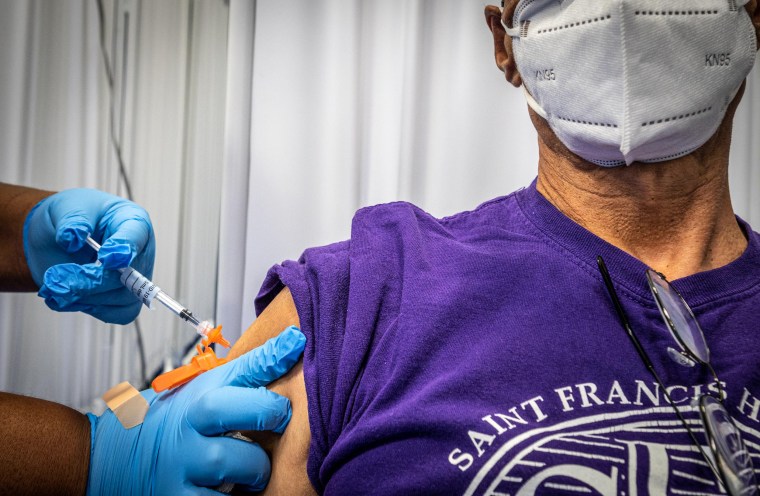The death of Gen. Colin Powell is a bleak reminder of the power of the coronavirus, but it is already serving as a rallying cry for the misinformation machine that will use any tragedy to stoke skepticism in and fear of the power of vaccines. Powell, 84, was fully vaccinated, and his death has been reported as “complications from Covid-19," which has prompted every half-wit on Twitter or Substack to argue that vaccines don’t work.
What’s being ignored are the facts about vaccines, their limitations, breakthrough cases and implications for people with certain chronic conditions. Vaccines are incredibly effective, and unvaccinated people in the U.S. are 11 times more likely to die and 29 times more likely to be hospitalized for Covid-19 than those who are vaccinated. Like most vaccines, the Covid-19 vaccines aren’t 100 percent effective, which translates into the inevitability of breakthrough infections and, in rare cases, hospitalizations and deaths. The far-right anti-vaccine movement has seized upon the mere existence of breakthrough cases to cast doubt and the 7,148 deaths out of 187 million vaccinated people in the U.S. to make the absurd argument that Covid-19 vaccines are deadly.
Unvaccinated people in the U.S. are 11 times more likely to die and 29 times more likely to be hospitalized for Covid-19.
Breakthrough infections occur more often in areas where there are higher transmission rates and in people who are less likely to mount full immune responses. Powell had numerous risk factors for such a breakthrough infection: He had been treated for a rare blood cancer called multiple myeloma, he had been diagnosed with Parkinson’s disease, and he had a history of prostate cancer. The combination of those chronic conditions and his advanced age placed him at a higher risk for a breakthrough infection.
In addition, accumulating evidence suggests that patients with conditions such as multiple myeloma need third doses of an mRNA vaccine (Pfizer or Moderna) to achieve immunity. The third dose in immunocompromised people is distinct and different from the conversation around boosters. A third dose can be administered 28 days after a second dose; a booster, by contrast, is recommended only for certain populations six months after a second dose of an mRNA vaccine and two months after a Johnson & Johnson vaccine dose. Confusion over the distinction is apparent; many Americans have been seeking additional vaccine doses when they don’t meet eligibility criteria.
If there are lessons to be gleaned from Gen. Powell’s death, it’s that there’s a need for more education for individuals, family members and friends of patients who are immunocompromised. First, anybody with an immunocompromised status needs a third dose of an mRNA vaccine to mount the same immune response a healthy person gets after two. But even with that third dose, immunocompromised people are still at risk of getting sick and must follow precautions, such as wearing masks and practicing social distancing, even when the rest of the country might remove masks.
Trials are underway to consider administering monoclonal antibodies along with a vaccine as a layer of added protection, especially in immunocompromised people. Until then, these people are at risk of catching Covid-19 and experiencing complications. Friends and family members should also take precautions and get vaccinated as a first line of defense and have the common sense to avoid being around someone experiencing any symptoms related to Covid-19.
Vaccines do their best work when a meaningful number of people in a community have been vaccinated.
America has struggled to strike the right balance in its communications about vaccines. Perhaps the message should be simplified this way: Being vaccinated is better than being unvaccinated. A Covid-19 vaccine isn’t perfect, but very few vaccines confer nearly perfect immunity. Vaccines do their best work when a meaningful number of people in a community have been vaccinated, breaking potential chains of transmission and creating dead ends for the virus. America is getting closer, with 58 percent of the country having been fully vaccinated, but that’s a far cry from the levels needed to reduce viral activity. The rate is lower than it needs to be, which will mean infections among the unvaccinated and, to a lesser degree, breakthrough infections among the vaccinated.
Gen. Powell was the first Black national security adviser, the first Black chairman of the Joint Chiefs of Staff and the first Black secretary of state, but sadly his death is not a first. He is joined by 725,820 other people, and thousands more die every day. Since the vaccine has been in wide circulation, the overwhelming majority of the people who have died have not been vaccinated. Focusing on the rare person who was vaccinated is dangerous if it encourages people to decline their best shot at protection.

